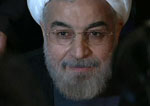 PolicyMic: Ever since the sham presidential elections in Iran, Western media have lost no opportunity to characterize new President Hassan Rouhani, long a senior figure among the regime’s ruling elite, as a “moderate.”
PolicyMic: Ever since the sham presidential elections in Iran, Western media have lost no opportunity to characterize new President Hassan Rouhani, long a senior figure among the regime’s ruling elite, as a “moderate.”
PolicyMic.com
Allen Tasslimi
 Ever since the sham presidential elections in Iran, Western media have lost no opportunity to characterize new President Hassan Rouhani, long a senior figure among the regime’s ruling elite, as a “moderate.”
Ever since the sham presidential elections in Iran, Western media have lost no opportunity to characterize new President Hassan Rouhani, long a senior figure among the regime’s ruling elite, as a “moderate.”
But by any common definition of the word “moderate,” Rouhani is anything but. Look at his proposed cabinet to understand his agenda for Iran; many were in fact senior officials over the past 30 years, and participated in some of the most egregious crimes of war, political suppression, and the export of terrorism and religious fundamentalism.
Mostafa Pour-Mohammadi, the choice for minister of Justice, was for years a deputy in the Ministry of Intelligence, a position that allowed him to participate in the death committees responsible for the 1988 massacre of 30,000 political prisoners. The overwhelming majority of those prisoners were activists in the Mojahedin-e-Khalq (PMOI/MEK).
Nearly all of the massacre victims had either served prison terms imposed by kangaroo courts, or had completed such prison terms from which they had not yet been released. Only a handful survived.
Hundreds of Khomeini’s political opponents were hung, their corpses hurriedly buried in mass graves. Twenty-five years later, no one has been able to uncover all the details of this atrocity.
Khomeini created “Amnesty Commissions” for political prisoners that were in fact death commissions. The members included a representative of the Ministry of Intelligence, a religious judge, and a prosecutor, with the Intelligence Ministry officer having the final say on the fate of any individual examined by the commissions. In Tehran, that official was Pour-Mohammadi.
All ranking members of the Khomeini regime in 1988 were complicit in the massacre. Those who protested it were removed from office. One such individual, Ayatollah Hossein Ali Montzaeri, was Khomeini’s designated successor at the time, but his protest against the massacre caused his fall from Khomeini’s grace, and he was sacked in March of 1989. In 2000, Montzaeri published a memoir in which he revealed something of the massacre’s horror.
And that was not all. His choice of defense minister, Hossein Dehghan, was not only among the radical students who took 52 American diplomats hostage for 444 days, but was also a founder of the terrorist Hezbollah group in Lebanon.
Rouhani has also bragged about deceiving the international community by engaging in make-believe talks, while giving the clerics valuable time to complete their nuclear projects and the enrichment cycle. And last but not least, he has been an outspoken supporter of the murderous regime of Bashar al-Assad in Syria.
It is all very well and good for Rouhani to describe himself as a moderate, and to speak about greater engagement with the West. But for such words to be believable, he must back them up with specific actions. In an address to 100,000 expatriates this past June 22 in Paris, Maryam Rajavi, president-elect of the opposition National Council of Resistance of Iran, said that change in Iran is unimaginable without the release of political prisoners, freedom of expression, freedom for diversity of political parties, a cessation of meddling in the affairs of Syria and Iraq, and an end to Iran’s nuclear weapons program. Any true moderate would do what he could to implement these measures.
That is precisely what U.S. lawmakers agree on. In a letter to President Obama earlier this year, 76 bi-partisan senators, including its sponsor, New Jersey’s Senator Robert Menendez, urged the administration to stay the course in dealing with Tehran’s nuclear intransigence and look for substance and not style.
As Iranian Americans, we fully agree. The United States, which champions freedom and human rights around the world, should reach out the millions who cry for freedom instead offering carrots to phony moderates. Such policy would benefit all those who seek a legitimate and just government in Tehran, and a prosperous Iran integrated into the world economy.


